Meet greenhouse farmer Alice Maina
At an age where most people would think of retiring, Alice Maina has started a flourishing small agri-business which will set her and her husband up safely for old age. Thanks to Hand in Hand’s support she now earns KES 20,000 (US $231) a month selling tomatoes and ‘piri piri’ chilli peppers, grown in a greenhouse which she built on her land.
Making ends meet
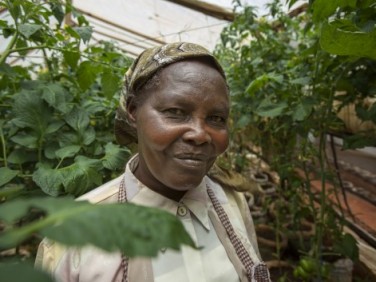 Alice lives in a hamlet near Gatundu, in Kiambu county, which despite being only 16 kilometres north of Nairobi is a lush rural area dominated by large commercial farms growing coffee, tea and pineapples. Automation means these farms do not offer much local employment. Instead, most people here are subsistence farmers who just about manage to live off small family-owned plots, which are shrinking in size as the population continues to grow. Alice was a public school teacher – a poorly paid profession in Kenya – when arthritis forced her to retire early. She and her husband were growing vegetables for their own consumption.
Alice lives in a hamlet near Gatundu, in Kiambu county, which despite being only 16 kilometres north of Nairobi is a lush rural area dominated by large commercial farms growing coffee, tea and pineapples. Automation means these farms do not offer much local employment. Instead, most people here are subsistence farmers who just about manage to live off small family-owned plots, which are shrinking in size as the population continues to grow. Alice was a public school teacher – a poorly paid profession in Kenya – when arthritis forced her to retire early. She and her husband were growing vegetables for their own consumption.
Gatundu, Kenya
A bold investment
When Hand in Hand started training her local members’ group, Alice recognized that in order to survive she needed to make her only asset work harder. Alice borrowed money from her local group’s savings fund to buy piri piri chilli seeds, knowing the small peppers fetch a good price on the local market. Her first crop of chillies produced an income of KES 48,000 (US $550) in two months. “I made a good profit because I cut out the middle man and went to the market myself to sell the chillies,” says Alice.
Alice then used KES 15,000 (US $170) of the proceeds and a loan of KES 100,000 (US $1,000) from Kenya’s leading microfinance institution, to whom her Hand in Hand trainer introduced her, to build a small greenhouse.
Thriving on tomatoes
Thanks to the greenhouse, she managed to grow a sizeable crop of beautiful tomatoes. The former teacher has a keen understanding of competition and attributes her commercial success to three things: “Better quality – my greenhouse tomatoes taste better than the normal ones. Good presentation – I always wash them and put them in nice boxes. And last, I’m a good saleswoman – I make sure to talk to all my customers. That’s why I sell more than others.”
“I cut out the middle man and went to the market myself”
Alice feels that the Hand in Hand business training has protected her economic future. “Ten shillings used to buy me flour, sugar, tomatoes and even milk, but now it hardly buys me anything. Life has changed and so I need to change.”
Not content to stand still, she is looking forward to a bigger second crop of tomatoes now. Her Hand in Hand trainer introduced her to a farming expert from the Kenyan Ministry of Agriculture to show her better horticulture techniques.
Sharing success
She is also employing Patrick Kahuni (pictured right), one of her neighbours, to water, fertilise and weed the plants while she goes to the market. Patrick,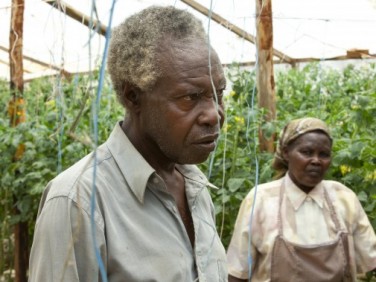 a father of ten, also farms his own ancestral land but, like Alice, could not make it pay. As a result, Patrick could not afford Kenya’s secondary school fees and four of his chyildren had to drop out of school. Working for Alice has meant that Patrick has managed to put one of his children through secondary education.
a father of ten, also farms his own ancestral land but, like Alice, could not make it pay. As a result, Patrick could not afford Kenya’s secondary school fees and four of his chyildren had to drop out of school. Working for Alice has meant that Patrick has managed to put one of his children through secondary education.
Alice herself is funding her granddaughter’s secondary schooling and is saving up for her own old age.
“I am over 60 now so, God willing, one day I will not have to work anymore. I want to save today, for tomorrow. I want to work hard then retire.”
Alice’s results
Monthly income of KES 20,000 (US $231)
Funds granddaughter’s schooling
Employs neighbour with a family of 10
Padmavathi, sculptor
Padmavathi is a 26-year-old mother of two. For her and her family life has been a long struggle. Although she was born into a sculpting family, and learnt the skill as a child, Padmavathi soon discovered it was not considered a profession for women. Her education was short-lived and then she was married off to a sculptor. Unfortunately, orders were hard to come by and their income was meagre.
Then Padmavathi heard about Hand in Hand and joined a Self-Help Group, where she was taught how to save, the basics of accounting and how to expand a small business. She took a loan not only to expand her husband’s business by buying raw material and better tools but also to take up sculpting herself.
She has already paid back that first loan and says “Repayment is not a problem. I made sure the loan is used only for business.”
The village still marvels at her transformation into a self-assured professional sculptor who earns anywhere between INR 7,000 and INR 10,000 a month (US $150 – 200).
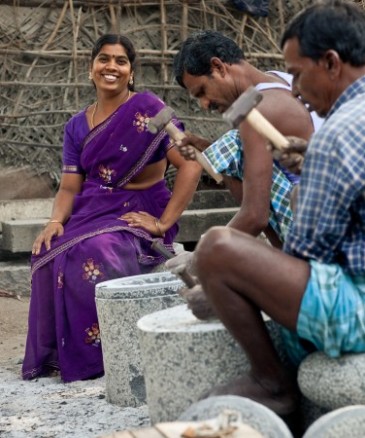
Meet Mushtary, Rejin’s first female shop owner
Mushtary is breaking new ground as a shopkeeper and entrepreneur in the rural village of Rejin, Afghanistan.
A shop to stave off hunger
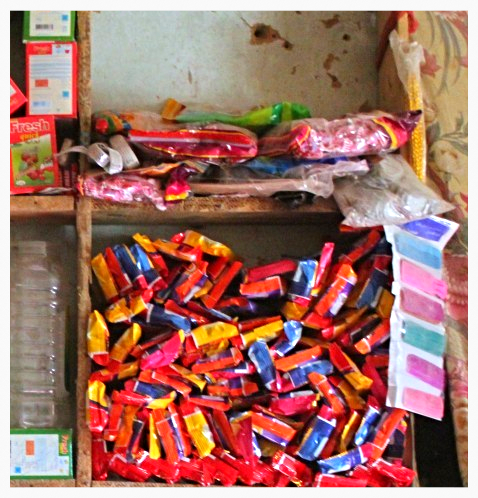
Mushtary’s shop |Products on shelf | Balk province, Afghanistan
The regular profits from her business enable her to supplement the small and variable income the family gets from farming. “Farming in our area is risky because we rely on the rain and if the weather is not right then we lose everything. The shop means that even in the bad times we can buy food to eat.”
Initially Mushtary and her neighbours joined the Self-Help Group set up by Hand in Hand Afghanistan in their village out of curiosity but quickly realised that there was so much they could learn. Together the group of 20 members began saving a little money each week to build up a group savings fund and learnt basic business skills such as bookkeeping.
Historically the people in Rejin village are farmers, so the majority of the members in the group decided to use their new skills to branch out into animal husbandry. Mushtary had other ideas. She and her husband had struggled for many years to support their family on the income from farming but they could not rely on this income. Everything depended on the weather. Mushtary saw an opportunity to stabilise the family income.
Rejin’s first retailer
Rejin is an isolated rural village. Women have to travel long distances to buy everyday household items and Mushtary realised that if there was a shop in the village, local people would chose to buy what they needed here. So, Mushtary borrowed from the group fund in order to buy her initial stock of clothes. These sold so well that Mushtary made a profit of AFN 5,000 (US $96). From this small beginning she went on to borrow a further AFN 10,000 (US $192) and has now opened a shop selling tea, sugar, biscuits, chewing gum, shampoo, washing up liquid, soap and many more necessary items.
“Even in the bad times we can buy food to eat”
Meet Najia, Nahri Shahi district’s most canny businesswoman
Najia is a canny entrepreneur in more ways than one. Armed with nothing but her wits and the skills she learned at a Hand in Hand Afghanistan Self-Help Group, the mother of four increased her income from zero to 40,000AFN (US $720) a month – all by selling canned goods.
Financial success has of course been rewarding, says Najia, who like most Afghans has no surname. But a newfound sense of empowerment makes the long, often gruelling hours especially worthwhile. “My life has totally changed,” she says. “I’m no longer dependent on anyone else’s income and I can easily purchase clothes and school materials and take my children to the doctor. I’m even saving for emergencies – and to expand my enterprise.”
Loans, not grants
Like any budding entrepreneur, Najia needed credit. There was just one problem: she didn’t qualify, not even for a microloan. Self-Help Groups offer members the opportunity to learn, to develop opportunities, even simply to socialise outside the home. They also offer access to group savings funds, available to members who’ve paid in and undergone training. As soon as she was ready, Najia applied for a loan using a strategy every bit as simple as it was effective: serving her food to group members and letting it do the talking. The group was convinced; Najia got her loan.
“I had the talent,” she says, “but I didn’t know the basics of enterprise. Hand in Hand Afghanistan mentors helped me establish myself, both in terms of training and funding.”
“My life has totally changed. I’m no longer dependent on anyone else’s income and I can easily purchase clothes and school materials and take my children to the doctor”
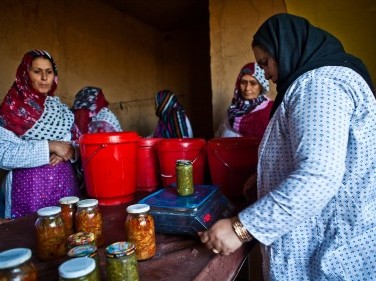
Najia secured two loans – 21,000AFN (US $378) from her group then 10,000AFN (US $180) from Hand in Hand, both now paid off. The first went to setting up her operation, the second to diversifying her product range.
“We prepare cans of pre-cooked meals with ingredients including okra, eggplant, peas, noodles and meat. I also make ketchup and jam,” she explains. “My meals are good quality and I supply them to the market quickly.”
Super markets
Starting out, Najia sold her food in neighbouring villages. Drawing on the lessons she’d learned about market linkages, she soon moved into Mazar-i Sharif. Then came her biggest success yet: a deal supplying food to the Ariana Supermarket.
Today, Najia has 18 part-time staff. She hopes to hire them full-time soon. “We plan to establish a small food product manufacturing plant with modern labelling machines to compete with imported cans,” she says.
Building confidence
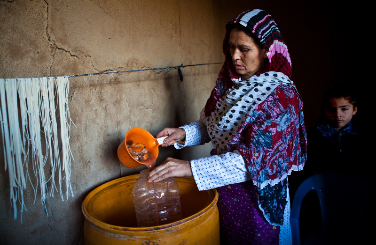 Impressive as it is, Najia’s success is not unique. According to a recent independent review commissioned by the Swedish International Development Cooperation Agency (Sida), Afghans are reaping the benefits of Hand in Hand’s programmes, citing the value of training and savings, as well as a newfound freedom of movement. Others meanwhile credited interaction among group members with instilling a new sense of self-confidence. Not surprisingly, Najia was among them.
Impressive as it is, Najia’s success is not unique. According to a recent independent review commissioned by the Swedish International Development Cooperation Agency (Sida), Afghans are reaping the benefits of Hand in Hand’s programmes, citing the value of training and savings, as well as a newfound freedom of movement. Others meanwhile credited interaction among group members with instilling a new sense of self-confidence. Not surprisingly, Najia was among them.
“I feel happy I decided to start my own business,” she says. “And confident to expand it.”
Najia’s results
![]()
Increased monthly income from 0 to 40,000 AFN (US $720)
![]()
Expanded business to other districts and local supermarkets
![]()
Employed 19 part-time staff
Chanar Gul: from subsistence to success
Give a man a fish and he’ll eat for a day. Give him business training and access to credit and he’ll establish a profitable calf-rearing business with eight partners, more than tripling his income, then use the waste to help offset his fuel expenses. At least, that’s what Chanar Gul did.
“Before (joining Hand in Hand) I was only earning enough to feed my family. Now I can pay for school expenses and even save some money every month,” says the married father of two from Sholgara district, north Afghanistan, not far from the Uzbek border.
Mixed tidings
Chanar’s district is highly populated and ethnically mixed, with substantial Pashtun, Tajik, Uzbek and other communities.
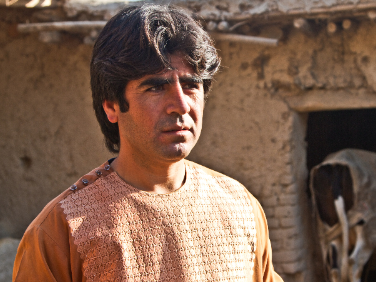 A newly paved road from Mazar-i-Sharif, the region’s biggest city, connects with a vibrant marketplace in the district centre – a boon to commercial farmers such as Chanar. Still, there are reasons to be concerned. Explosives discovered along the road in recent months have prompted major questions about the area’s security, and earthquakes in the region are common. Floods are too. In spring 2013, heavy rainfall forced thousands of families from their homes, killing dozens and destroying thousands more livelihoods.
A newly paved road from Mazar-i-Sharif, the region’s biggest city, connects with a vibrant marketplace in the district centre – a boon to commercial farmers such as Chanar. Still, there are reasons to be concerned. Explosives discovered along the road in recent months have prompted major questions about the area’s security, and earthquakes in the region are common. Floods are too. In spring 2013, heavy rainfall forced thousands of families from their homes, killing dozens and destroying thousands more livelihoods.
“I am more hopeful for my family’s future”
Sholgara District, Afghanistan
Bullish growth
Cows are big business in Sholgara district, where families treat livestock the way Westerners treat savings accounts: as a source of security. Given his experience working on a neighbour’s farm, Chanar was sure his own business could be commercially viable. But lacking the right skill set to strike out on his own, he was stuck earning a subsistence wage of 2,000 Afghanis (US $36) a month – far from enough to cover his growing family’s expenses. Anxious to improve his situation, the 27-year-old joined a Hand in Hand Self-Help Group to receive business training and learn about peer-to-peer lending.
 Just a few months later, after establishing a strong sense of mutual trust, Chanar and eight group members went into business. Armed with a small loan and help from a vocational mentor with livestock management, animal health and more – both supplied by Hand in Hand Afghanistan – the group achieved total self-sufficiency in only two months. They’re also well on their way to paying off their loan, thanks in no small part to the money they’ve saved using cow dung as a cheap, energy efficient and sustainable source of fuel.
Just a few months later, after establishing a strong sense of mutual trust, Chanar and eight group members went into business. Armed with a small loan and help from a vocational mentor with livestock management, animal health and more – both supplied by Hand in Hand Afghanistan – the group achieved total self-sufficiency in only two months. They’re also well on their way to paying off their loan, thanks in no small part to the money they’ve saved using cow dung as a cheap, energy efficient and sustainable source of fuel.
“Now I earn 6,000 AFN (US $108) a month and I’m more hopeful for my family’s future,” says Chanar.
Chanar’s results
Monthly income of 6,000 AFN (US $108)
300% increase over previous income
More hope for his children’s future
Meet Gloria, the former refugee growing crops – and profits
It took 15 years for Gloria Kabagwira to get back to her native Rwanda. With the right training and access to credit, it only took three more for the 46-year-old to become one of her district’s most successful farmers.
A country of farmers
Rwanda is on the rise. In its efforts to meet the Millennium Development Goals, says the UN, the country was “top-performing”. But despite a sizeable mining sector and ambitious government plans to electrify 70 percent of homes and businesses by 2017, Rwanda’s economy remains overwhelmingly agricultural. Almost 80 percent of the population is engaged in farming, most at the subsistence level.
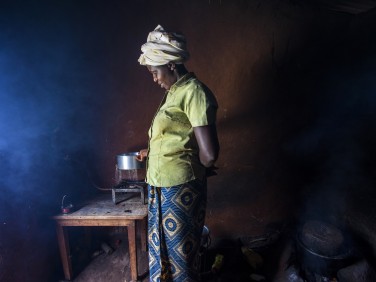 Gloria’s village is no exception. Here in Mpanga, some 12 miles from the nearest paved road, homes are made from mud bricks, electricity is non-existent and the nearest water pump is a good half-mile away. “And it’s not good water,” she says.
Gloria’s village is no exception. Here in Mpanga, some 12 miles from the nearest paved road, homes are made from mud bricks, electricity is non-existent and the nearest water pump is a good half-mile away. “And it’s not good water,” she says.
Twenty years ago, the Rwandan genocide claimed an estimated 800,000 lives. Another 800,000 people were displaced. Gloria, who returned from Tanzania in 2009 after the government promised her a free hectare of land, was among them. “When we came back we were poor. The government gave us the land but we did not know how to use it,” she says. “We survived because in this area it is easy to grow bananas and maize. Not much else, though.”
Mpanga region, Rwanda
Life savings
Things began to change in 2011 when Gloria joined a local community savings group, compelled by a mixture of curiosity and desperation. For the first time in her life, the mother of eight had access to skills and business training.
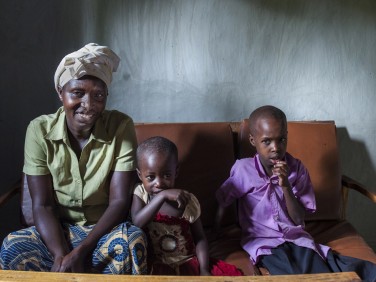 Crucially, she could also access credit via the group fund. “I contributed 400 Rwandan Francs (US $0.60) a week by working in the fields,” she says. “It wasn’t easy, but it was worth it.” Before long, the 30-strong group was ready to start lending. Gloria, meanwhile, was ready to borrow. “I was growing a few crops to eat but I knew that if I grew tomatoes and cabbages then I would be able to sell them, so I took a loan from the group of 25,000 RWF (US $36) to buy tomato seedlings,” she says. “It was a lot. I was afraid how to pay it back, it was so big.” But pay it back she did. Today, Gloria’s crops bring in some 500,000 RWF (US $720) a season, $250,000 RWF (US $360) in pure profit. And she isn’t stopping there.
Crucially, she could also access credit via the group fund. “I contributed 400 Rwandan Francs (US $0.60) a week by working in the fields,” she says. “It wasn’t easy, but it was worth it.” Before long, the 30-strong group was ready to start lending. Gloria, meanwhile, was ready to borrow. “I was growing a few crops to eat but I knew that if I grew tomatoes and cabbages then I would be able to sell them, so I took a loan from the group of 25,000 RWF (US $36) to buy tomato seedlings,” she says. “It was a lot. I was afraid how to pay it back, it was so big.” But pay it back she did. Today, Gloria’s crops bring in some 500,000 RWF (US $720) a season, $250,000 RWF (US $360) in pure profit. And she isn’t stopping there.
A capital idea
Between her own savings and help from the Rwandan government’s agricultural grants scheme, also facilitated by the group, Gloria has managed to build a water reservoir and instal her own biogas system, erasing the need to forage for fuel. She’s also expanded her acreage to grow passion fruit and papaya.
She credits her new income with much more than an improved quality of life. “In Rwanda, if you are a woman you look to everything from your husband. If you need salt, soap or clothes you must ask. You feel like you don’t have value,” she says. “Today I no longer have to beg from my husband. We share responsibility.”
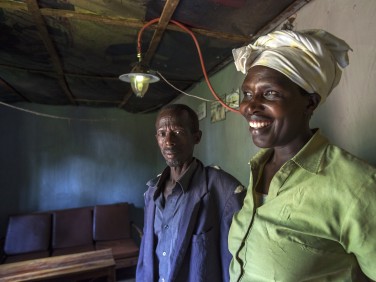 For all her success, Gloria has even bigger plans for her children:
For all her success, Gloria has even bigger plans for her children:
“I don’t want them to cultivate vegetables. I want them to get a good education and learn to speak English so that they can get good jobs.”
Gloria’s results
![]()
250,000 RWF (US $360) in pure profit per season
One of her district’s most successful farmers
![]()
Greater financial autonomy within the family
Hand in Hand Eastern Africa and CARE Rwanda are co-operating to empower some 100,000 Rwandans, mostly women, to work their way out of poverty by running their own sustainable businesses. The three-year, US $3.2 million partnership is grounded in our shared belief in the power of entrepreneurship to fight poverty.
Reaping what she sews: Odette Mukarusagara
Odette Mukarusagara still can’t believe it. “Local government officials come to visit me as a senior and respected member of the community, my neighbours trust me. I’m even on one of the senior committees of the National Women’s Council,” says the 43-year-old, incredulous.
It’s a far cry from two years ago, when Odette and her family survived off a small patch of land in Kiziguro, a rural village in Rwanda’s Eastern Province, growing beans, maize and bananas. “Honestly, our crops were only for food. They did not give us an income,” says the married mother of four. Most days they only ate once.
Odette tried her best to supplement the family income by making and selling clothes, but without enough startup capital – and even less business knowledge – soon found her efforts unravelling. Something had to change.
A helping hand
In early-2012, it finally did. Using what little income she’d earned selling clothes, Odette bought into a Village Savings and Loans (VSL) group organised by Hand in Hand partner CARE where members learned the basics of business and money management – saving, borrowing, paying loans back. Across Eastern Province, the groups are contributing to progress the UN Development Programme calls “especially impressive”.
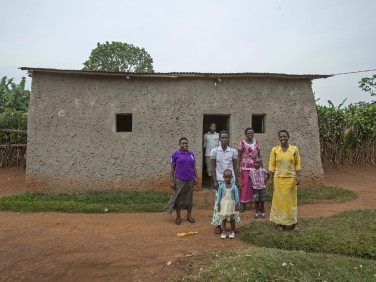 There can be no doubt the country has come an immensely long way since 1994,when genocide claimed some 800,000 lives – about 20 percent of the total population – in just 100 days. But for every reason to be optimistic there’s a corresponding reminder of how far the country has left to go.
There can be no doubt the country has come an immensely long way since 1994,when genocide claimed some 800,000 lives – about 20 percent of the total population – in just 100 days. But for every reason to be optimistic there’s a corresponding reminder of how far the country has left to go.
True, the poverty rate decreased almost 12 percent between 2006 and 2011, but an astonishingly high 24 percent of Rwandans still live in extreme poverty. Likewise, although primary education enrolment has reached almost 99 percent – the highest anywhere in Africa – secondary school enrolment continues to languish at 28 percent.
Kiziguro, Rwanda
Urban-rural divide
The urban-rural divide is another cause for concern. Countrywide, poverty is three times greater outside Rwanda’s cities, and Odette’s district is no exception.
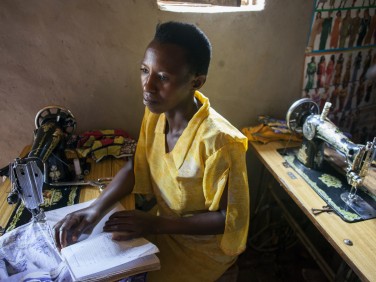 Here, just an hour-and-a-half’s drive from Kigali, homes are built out of mud-covered tree trunks and only 2.5 percent of people use electric lighting. Not surprisingly, formal sources of finance are vanishingly rare.
Here, just an hour-and-a-half’s drive from Kigali, homes are built out of mud-covered tree trunks and only 2.5 percent of people use electric lighting. Not surprisingly, formal sources of finance are vanishingly rare.
Unless, of course, you belong to a savings group. Odette borrowed 50,000 Rwandan francs (US $70) from the VSL group’s fund and quickly set about establishing her clothing business. Equipped with capital and newfound savvy, the budding micro-entrepreneur devised a plan to sell school uniforms to coincide with an upcoming term. They quickly sold for 100,000 RWF (US $140) – more than enough to cover her loan and invest in future growth. Odette was in business.
Future sewn up
Today, Odette owns four sewing machines, runs a sewing school and earns 50,000RWF (US $70) a month. Her success has inspired competition, but as the only tailor in her village with access to a nearby co-operative boasting more advanced machines, the tailor-cum-teacher isn’t worried. Perhaps best of all, subsistence farming is a thing of the past. “We employ others to work the land for us, we can buy things we can’t grow such as oil and we have more food,” says Odette.
“Local government officials come to visit me as a senior and respected member of the community, my neighbours trust me. I’m even on one of the senior committees of the National Women’s Council”
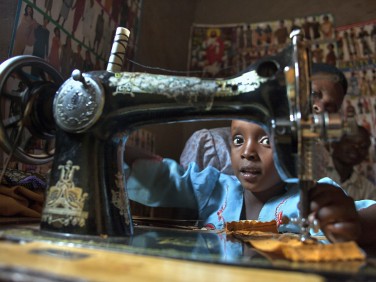 More time, too, most of which has gone into expanding her business. With help from her Hand in Hand trainer, Odette has already started saving for new space and machines for students. The resulting income, she says, will ensure an even brighter future for her five-year-old daughter, Divine.
More time, too, most of which has gone into expanding her business. With help from her Hand in Hand trainer, Odette has already started saving for new space and machines for students. The resulting income, she says, will ensure an even brighter future for her five-year-old daughter, Divine.
“Now that we have a regular income I’ll be able to afford the fees, clothes, books and bags for secondary school and university,” says Odette.
Odette’s results
![]()
Monthly earnings 50,000 RWF (US $70)
![]()
Earnings covered loan and investments for future growth
![]()
Able to afford secondary school and university for her daughter
Hand in Hand Eastern Africa and CARE Rwanda are co-operating to empower some 80,000 Rwandans, mostly women, to work their way out of poverty by running their own sustainable businesses. The three-year, US $3.2 million partnership is grounded in our shared belief in the power of entrepreneurship to fight poverty.
